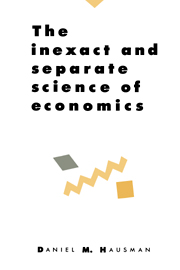Part II - Theory assessment
Published online by Cambridge University Press: 04 August 2010
Summary
Part I distinguished models and theories and clarified the importance of model construction in theoretical economics. It thus helps defuse superficial criticisms of microeconomics and postpones questions of empirical assessment. But economics only provides knowledge of economies if it consists of valuable theories as well as of elegant models. In part II, I turn to the central problems of theory assessment, canvas the traditional solutions to them, and offer my own resolutions.
When one thinks of economic methodology, the first questions that come to mind are questions of appraisal. Is equilibrium theory a good theory? What sort of confidence should economists place in it? Do economists behave as good scientists should? Are standards for appraising social theories the same as those which apply to the theories of the natural sciences? When one focuses on economics, these questions seem particularly pressing, for economic theory strongly resembles theories in the natural sciences, except in predictive success. One of the most striking problems of theory appraisal in economics is that equilibrium theory is full of “laws” that are, if taken literally, false, and further false assertions are made when the theory is applied to specific problems. Do these facts show that there is something fundamentally wrong with economics?
I shall try to show that the answers to these questions lie in the peculiarities of the structure and strategy of economic theory discussed in part I and in the complexities of economic phenomena rather than in problems of confirmation theory.
- Type
- Chapter
- Information
- The Inexact and Separate Science of Economics , pp. 121 - 122Publisher: Cambridge University PressPrint publication year: 1992



